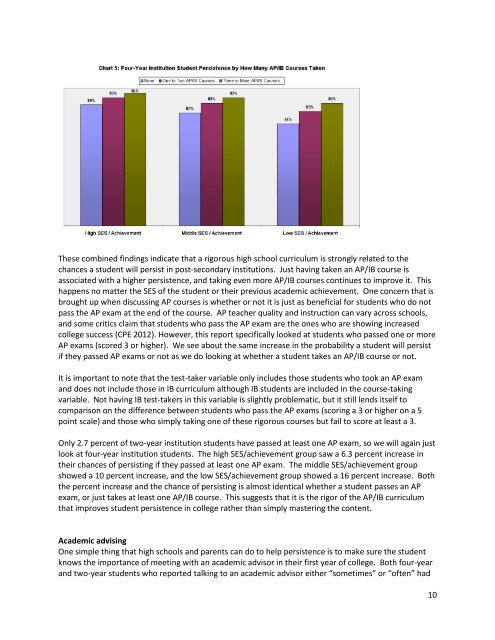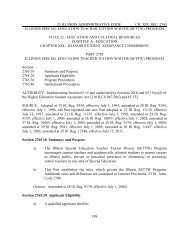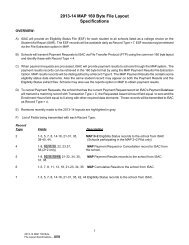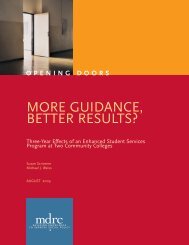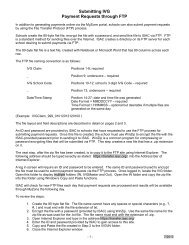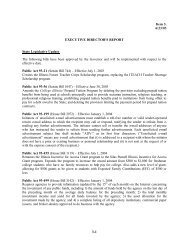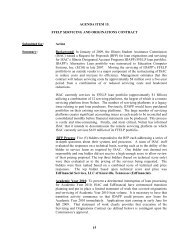High school rigor and good advice: Setting up students to succeed
High school rigor and good advice: Setting up students to succeed
High school rigor and good advice: Setting up students to succeed
You also want an ePaper? Increase the reach of your titles
YUMPU automatically turns print PDFs into web optimized ePapers that Google loves.
These combined findings indicate that a <strong>rigor</strong>ous high <strong>school</strong> curriculum is strongly related <strong>to</strong> the<br />
chances a student will persist in post-secondary institutions. Just having taken an AP/IB course is<br />
associated with a higher persistence, <strong>and</strong> taking even more AP/IB courses continues <strong>to</strong> improve it. This<br />
happens no matter the SES of the student or their previous academic achievement. One concern that is<br />
brought <strong>up</strong> when discussing AP courses is whether or not it is just as beneficial for <strong>students</strong> who do not<br />
pass the AP exam at the end of the course. AP teacher quality <strong>and</strong> instruction can vary across <strong>school</strong>s,<br />
<strong>and</strong> some critics claim that <strong>students</strong> who pass the AP exam are the ones who are showing increased<br />
college success (CPE 2012). However, this report specifically looked at <strong>students</strong> who passed one or more<br />
AP exams (scored 3 or higher). We see about the same increase in the probability a student will persist<br />
if they passed AP exams or not as we do looking at whether a student takes an AP/IB course or not.<br />
It is important <strong>to</strong> note that the test-taker variable only includes those <strong>students</strong> who <strong>to</strong>ok an AP exam<br />
<strong>and</strong> does not include those in IB curriculum although IB <strong>students</strong> are included in the course-taking<br />
variable. Not having IB test-takers in this variable is slightly problematic, but it still lends itself <strong>to</strong><br />
comparison on the difference between <strong>students</strong> who pass the AP exams (scoring a 3 or higher on a 5<br />
point scale) <strong>and</strong> those who simply taking one of these <strong>rigor</strong>ous courses but fail <strong>to</strong> score at least a 3.<br />
Only 2.7 percent of two-year institution <strong>students</strong> have passed at least one AP exam, so we will again just<br />
look at four-year institution <strong>students</strong>. The high SES/achievement gro<strong>up</strong> saw a 6.3 percent increase in<br />
their chances of persisting if they passed at least one AP exam. The middle SES/achievement gro<strong>up</strong><br />
showed a 10 percent increase, <strong>and</strong> the low SES/achievement gro<strong>up</strong> showed a 16 percent increase. Both<br />
the percent increase <strong>and</strong> the chance of persisting is almost identical whether a student passes an AP<br />
exam, or just takes at least one AP/IB course. This suggests that it is the <strong>rigor</strong> of the AP/IB curriculum<br />
that improves student persistence in college rather than simply mastering the content.<br />
Academic advising<br />
One simple thing that high <strong>school</strong>s <strong>and</strong> parents can do <strong>to</strong> help persistence is <strong>to</strong> make sure the student<br />
knows the importance of meeting with an academic advisor in their first year of college. Both four-year<br />
<strong>and</strong> two-year <strong>students</strong> who reported talking <strong>to</strong> an academic advisor either “sometimes” or “often” had<br />
10


